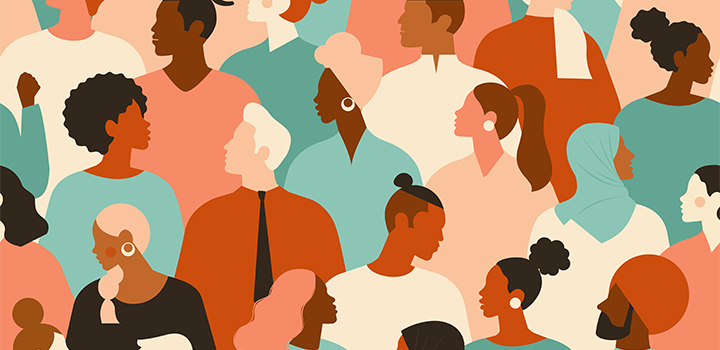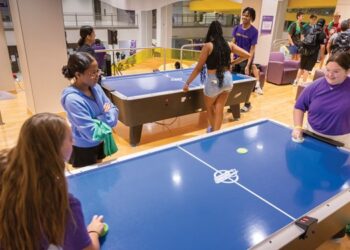We asked for nominations of EDI programs and services in the industry. Following is an in-depth look at those offerings.
2SLGBTQIA+ and Women’s Only Fitness
Location: University of Windsor in Canada
Fei Qin, a Lancer Recreation EDI supervisor, noticed many women and queer folks didn’t feel comfortable in the gym environment. As such, Qin decided to bridge the gap by providing a safe space.
The 2SLGBTQIA+ and Women’s Only Fitness is held in a private room with frosted windows. “The door is closed with a massive sign in front of it to ask the reader to read the sign before entering to ensure privacy and ensuring the right populations are using the room,” shared Qin.
Although the impact of this program has yet to be assessed, Qin remains focused on making fitness accessible and welcoming to everyone.
Adaptive Recreation: Goalball and Wheelchair Basketball
Location: University of Minnesota Twin Cities
Goalball started at the University of Minnesota Twin Cities when two students with a visual impairment asked for it. Wheelchair basketball was reignited when a former professional wheelchair basketball player approached the department.
“Both of these offerings came about because people with a passion saw an opportunity in our campus community to encourage inclusion through recreation and sport,” said Shandon Sutherland, the Intramural Sports and Inclusive Recreation manager.
Along with Jamie Medina, the St. Paul gym facility director, these two programs have taken off at the university. A grant from the Office of Student Affairs allowed them to purchase goalball goals, and the wheelchairs were already on hand. Sutherland shared it’s key to have regular and frequent occurrences of events as well as listening to players and making these programs visible.
“By way of smiles, companionship and competition, these offerings promote EDI in the brightest of lights,” said Sutherland.
Fantasy Football
Location: Austin Community College
With 11 campuses spread across the Austin district, Tracy Partin, the manager of Rec Sports and Athletics, shared the Fantasy Football program reaches each location. It allows students unable to attend in-person sporting events to find involvement in an online sport.
“Our Fantasy Football program became very popular during COVID-19 as being one of our online programs that our Intramural/Recreation students could enjoy,” said Partin. “Diversity, inclusion and equity all are main ingredients in our programs. Many of our students come from a diverse background, such as non-traditional, international, neuro-diverse, different socio-economic backgrounds and first-year, just to name a few.”
African American Museum of Southern Arizona Partnership
Location: University of Arizona
Drake Belt, the associate director of Facility and Safety Operations, shared the departmental Inclusivity Work Team scheduled a tour of the newly opened African American Museum of Southern Arizona.
There, they watched a video interview with Elgie Mike Batteau who helped integrate the swimming pools at the University of Arizona. “Beverly Elliott, the executive director of the museum, was our tour guide, and we spoke about some of the efforts we have done to educate our staff about the history of the pools at the university,” shared Belt. “This led to a meeting with Elliott about possible options to fund Black youth swim lessons.”
Thus, the partnership was born with the museum helping facilitate swim lessons and distribute swim gear. “We hope this increases swimming competencies in our community, specifically for those who identify as African American,” said Belt. “Additionally, we hope this educates our staff and other users to the disparities in water competency and to emphasize why learning to swim is important.”
IDEA Committee
Location: Duke University
Standing for Inclusion, Diversity, Equity and Accessibility, the IDEA Committee has several goals as shared by Ashley Champigny, the managing director of People and Culture:
- Provide staff education/training around diversity, equity, inclusion and belonging (DEIB) topics.
- Distribute a monthly calendar to full-time staff that highlights that month’s holidays and awareness — including local programing and education sessions — around DEIB.
- Partner with local organizations to provide community service opportunities.
- Work with campus affinity groups to make sure offerings are inclusive and people feel like they belong.
International Spin
Location: University of Windsor in Canada
Emily Stanley, a student employee at Lancer Recreation, was inspired to start International Spin after months spent swapping experiences between herself and international students.
“As I got closer to everyone, I felt an urgency to facilitate an international-to-international student connection through a fitness medium,” said Stanley. “So far, I have seen students from all over connect based on a shared passion for fitness and similarities through their experiences travelling way from home.”
Training in EDI
Location: Kennesaw State University (KSU)
Communication and conversations at KSU around EDI are becoming commonplace. Carolyn Kuzontkoski, the associate director of Recreation Programs and Facilities, shared they’re trying to build awareness and give students resources for these conversations. One specific way they’re looking to do this is building content awareness onboarding training modules. Kuzontkoski said along with her colleague Brandy Moss, they’re using the online learning platform D2L to have resources that staff can tap into at any point to learn more about EDI. It would be a handbook of sorts.
Women Adventure Outdoors
Location: University of Wisconsin Oshkosh (UW Oshkosh)
Women Adventure Outdoors started as a program shared between the Outdoor Adventure Center and Women’s Center at UW Oshkosh. Led by Alicia Johnson and Greg Batten, the interim director of Student Recreation, the program wasn’t possible without its student leaders — Nicole Crescio, Claire Stone, Kelsey Lien and Eliza Farrow to name a few.
“All activities were aimed at creating space where folks could learn or participate and not fear judgement, comparison or being looked at in many of the ways women experience in the outdoor world,” said Batten.
Aiming to host one trip or event each month of a semester, Batten said the growth in confidence of women trip leaders as well as their enthusiasm to learn has been evident. Plus,they now collaborate with other offices, like running camping trips for the LGBTQ+ Resource Center and securing funding for an Action Chair to provide outdoor access to folks with physical needs or limitations.
“This relationship is continuing to build connections between our outdoor program and other EDI services as well,” said Batten.










